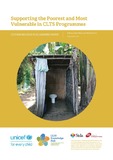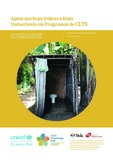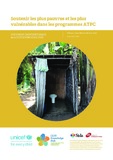| dc.contributor.author | Myers, Jamie | |
| dc.contributor.author | Gnilo, Michael | |
| dc.date.accessioned | 2017-11-28T14:31:10Z | |
| dc.date.available | 2017-11-28T14:31:10Z | |
| dc.date.issued | 2017-09 | |
| dc.identifier.citation | Myers, J. and Gnilo, M. (eds.) (2017) ‘Supporting the Poorest and Most Vulnerable in CLTS Programmes’, CLTS Knowledge Hub Learning Paper, Brighton: IDS | en |
| dc.identifier.citation | Myers, J., Gnilo, M. (2017) Apoio aos Mais Pobres e Mais Vulneráveis em Programas de CLTS, Documento De Reflexão Do CLTS Knowledge Hub, Brighton: IDS | |
| dc.identifier.citation | Myers, J. et Gnilo, M. (2017) Soutenir les plus pauvres et les plus vulnérables dans les programmes ATPC, Document D’apprentissage De La CLTS Knowledge Hub, Brighton: IDS | |
| dc.identifier.uri | https://opendocs.ids.ac.uk/opendocs/handle/20.500.12413/13384 | |
| dc.description.abstract | The CLTS Knowledge Hub and UNICEF convened an Asia-focused workshop titled ‘Supporting the Poorest and Most Vulnerable in CLTS Programmes’ in the Philippines in May 2017. The event brought together participants with experience of working on directly, supporting or researching CLTS programmes from across the continent. Over the course of five days participants representing a range of different organisations explored ways the poorest and most vulnerable can be supported both through strengthening the CLTS process and the introduction of support mechanisms. This Learning Paper is more than just a summary or record of the event, and aims to provide a starting point for the conversation on this critical subject to continue within the WASH sector. It focuses on strengthening the CLTS process, identifying and targeting people for support, the sequencing of support mechanisms, roles and responsibilities of stakeholders and the different support mechanisms and the associated risks. It concludes with summarising some emerging principles, considerations and recommendations which are not just relevant for CLTS programmes but other approaches, all of which are working towards equitable and adequate sanitation for all by 2030. This publication complements the Learning Brief "Supporting the least able throughout and beyond CLTS". | en |
| dc.description.abstract | Desde a sua criação há quase 20 anos, o Saneamento Total Liderado pela Comunidade (Community-Led Total Sanitation, CLTS) espalhou-se por mais de 60 países e teve como resultado milhões de pessoas em todo o mundo a viver em comunidades Livres de Fecalismo a Céu Aberto (Open Defecation Free, ODF). Esta abordagem afastou-se dos programas de saneamento orientados para subsídios, que muitas vezes levavam a construção desigual e utilização apenas parcial. Desde que se começou a implementar o CLTS em grande escala, porém, surgiram vários desafios. Estão a surgir dados que apontam para a necessidade de apoiar melhor as pessoas menos capazes de proporcionarem a si próprias instalações sanitárias acessíveis, sustentáveis e higiénicas. Tendo isto em consideração, o CLTS Knowledge Hub, com sede no Institute of Development Studies, e a UNICEF organizaram um workshop em que se procurassem formas de apoiar os mais pobres e vulneráveis da região da Ásia. De 24 a 28 de Maio de 2017, os participantes, pessoas com experiência
de trabalho em todo o continente asiático, reuniram-se em Tagaytay, nas Filipinas. | |
| dc.description.abstract | Depuis sa conception il y a bientôt vingt ans, l’Assainissement total piloté par la communauté (ATPC) s'est propagé dans plus de 60 pays et a permis à des millions de personnes à travers le globe de vivre
dans des communautés ayant mis fin à la défécation à l’air libre (FDAL). L’approche se démarquait de la programmation de l’assainissement à base de subvention, qui avait souvent débouché sur une
construction précaire et une utilisation partielle des toilettes; toutefois, depuis la mise en œuvre de l’ATPC, plusieurs problèmes sont apparus. Les données émergentes suggèrent qu’il est nécessaire de mieux aider les personnes les moins capables à se procurer par leurs propres moyens des installations sanitaires accessibles, durables et hygiéniques.
Fortes de ce constat, la CLTS Knowledge Hub, basée à l’Institute of Development Studies, et l’UNICEF ont organisé un atelier pour se pencher sur divers
moyens d’aider les plus pauvres et les plus vulnérables en Asie. Du 24 au 28 mai 2017, les participants, ayant déjà
travaillé sur le continent asiatique, se sont réunis à Tagaytay, aux Philippines. | |
| dc.description.sponsorship | Sida | en |
| dc.language.iso | en | en |
| dc.publisher | Institute of Development Studies | en |
| dc.relation.ispartofseries | CLTS Knowledge Hub Learning Paper; | |
| dc.rights.uri | http://creativecommons.org/licenses/by-nc-nd/3.0/ | en |
| dc.title | Supporting the Poorest and Most Vulnerable in CLTS Programmes | en |
| dc.type | Series paper (non-IDS) | en |
| dc.rights.holder | Institute of Development Studies | en |
| rioxxterms.funder | Default funder | en |
| rioxxterms.identifier.project | Default project | en |
| rioxxterms.version | NA | en |
| rioxxterms.funder.project | 9ce4e4dc-26e9-4d78-96e9-15e4dcac0642 | en |




